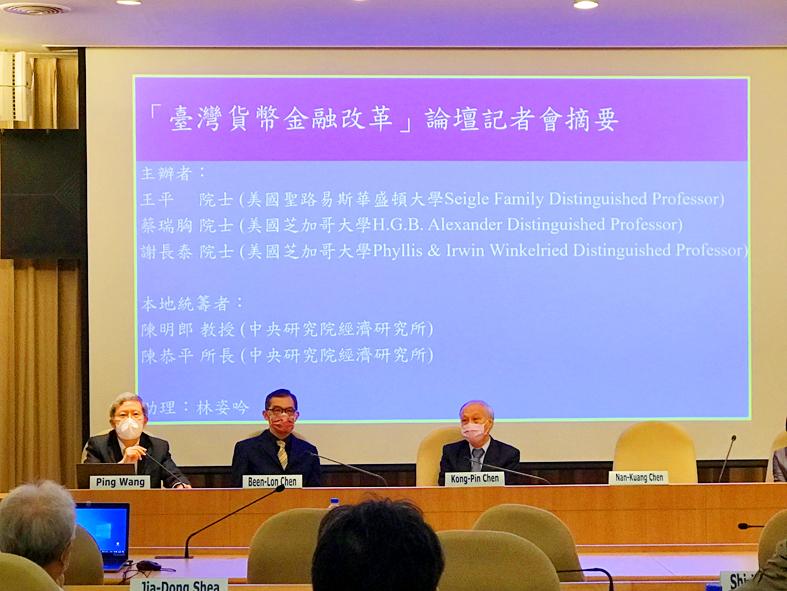Li Yi-ting (李怡庭), an academician at Academia Sinica, the nation’s top research institute, on Friday urged the central bank to disclose the value of its market interventions in a bid to facilitate accurate research.
Li, a newly elected academician and central bank board member, said the bank’s lack of disclosure of market intervention records makes it difficult for researchers to study such actions using precise historical data.
She made the comments at a news conference after a closed-door forum on monetary and financial reform in Taiwan held by Academia Sinica’s Institute of Economics.

Photo: Chen Mei-ying, Taipei Times
At the forum, central bank Deputy Governor Chen Nan-kuang (陳南光) and monetary experts from the US Federal Reserve Bank exchanged views with Academia Sinica researchers about financial reform in Taiwan.
The Institute of Economics also presented a draft white paper to offer advice on the topic.
Without any market intervention details, researchers must analyze changes in Taiwan’s foreign exchange reserves and the central bank’s foreign assets to estimate the value of market interventions, Li said.
The New Taiwan dollar this year weakened against the greenback due to inflation-fighting rate hikes by the Fed.
The central bank in March and April intervened to slow the depreciation of the local currency.
The bank had said its efforts were successful, but it did not reveal how much it spent selling US currency to purchase NT dollars.
The central bank last month also said that it made a limited intervention to cap the upturn of the US dollar with minimal effect on the value of foreign-exchange reserves.
The central bank last year stepped in during most forex trading sessions to limit the NT dollar’s gains as the Fed pumped funds into the market, but never called such actions interventions, saying only that it had a responsibility to fight volatility and maintain market stability.
Li said central banks in 43 countries — including Japan, South Korea and Singapore — disclose market intervention data on a monthly or quarterly basis, while the Fed publishes its data two years after interventions.
A five-year delay on publication by the local central bank would be acceptable to researchers, even if not ideal, she said.
Li also urged the government to improve the central bank’s independence by giving it the ability to set its own budget.
The central bank presently is a government entity that must submit its earnings to the treasury, which affects the bank’s decisionmaking, Li said.
Li said that it is her belief that the central bank keeps interest rates low and foreign exchange reserves high because it is pressured to submit earnings to the treasury.
Under the Central Bank of the Republic of China (Taiwan) Act (中央銀行法), the bank must set aside 50 percent of its net income as legal reserves.
Legally requiring the bank to submit its earnings to the treasury undermines its independence, Li said.
Meanwhile, Wang Ping (王平), another academician, told a news conference that the central bank should draft its own forward guidance as the Fed has done to improve its independence, accountability and transparency.
Such guidance enables the Fed to inform the public how it fights inflation upon the US consumer price index reaching 8 percent, he said.
The Fed describes forward guidance as a tool that central banks use to communicate with the public about the likely course of monetary policy, so individuals and businesses can use such information to make informed spending and investment decisions.
The central bank also needs a comprehensive data-analysis structure and a solid research foundation to improve decisionmaking, Wang said.
By keeping interest rates low and underestimating the value of the New Taiwan dollar, the central bank could undermine economic development, he said.

South Korea’s equity benchmark yesterday crossed a new milestone just a month after surpassing the once-unthinkable 5,000 mark as surging global memory demand powers the country’s biggest chipmakers. The KOSPI advanced as much as 2.6 percent to a record 6,123, with Samsung Electronics Co and SK Hynix Inc each gaining more than 2 percent. With the benchmark now up 45 percent this year, South Korea’s stock market capitalization has also moved past France’s, following last month’s overtaking of Germany’s. Long overlooked by foreign funds, despite being undervalued, South Korean stocks have now emerged as clear winners in the global market. The so-called “artificial intelligence

NEW IDENTITY: Known for its software, India has expanded into hardware, with its semiconductor industry growing from US$38bn in 2023 to US$45bn to US$50bn India on Saturday inaugurated its first semiconductor assembly and test facility, a milestone in the government’s push to reduce dependence on foreign chipmakers and stake a claim in a sector dominated by China. Indian Prime Minister Narendra Modi opened US firm Micron Technology Inc’s semiconductor assembly, test and packaging unit in his home state of Gujarat, hailing the “dawn of a new era” for India’s technology ambitions. “When young Indians look back in the future, they will see this decade as the turning point in our tech future,” Modi told the event, which was broadcast on his YouTube channel. The plant would convert

‘SEISMIC SHIFT’: The researcher forecast there would be about 1.1 billion mobile shipments this year, down from 1.26 billion the prior year and erasing years of gains The global smartphone market is expected to contract 12.9 percent this year due to the unprecedented memorychip shortage, marking “a crisis like no other,” researcher International Data Corp (IDC) said. The new forecast, a dramatic revision down from earlier estimates, gives the latest accounting of the ongoing memory crunch that is affecting every corner of the electronics industry. The demand for advanced memory to power artificial intelligence (AI) tasks has drained global supply until well into next year and jeopardizes the business model of many smartphone makers. IDC forecast about 1.1 billion mobile shipments this year, down from 1.26 billion the prior

People stand in a Pokemon store in Tokyo on Thursday. One of the world highest-grossing franchises is celebrated its 30th anniversary yesterday.